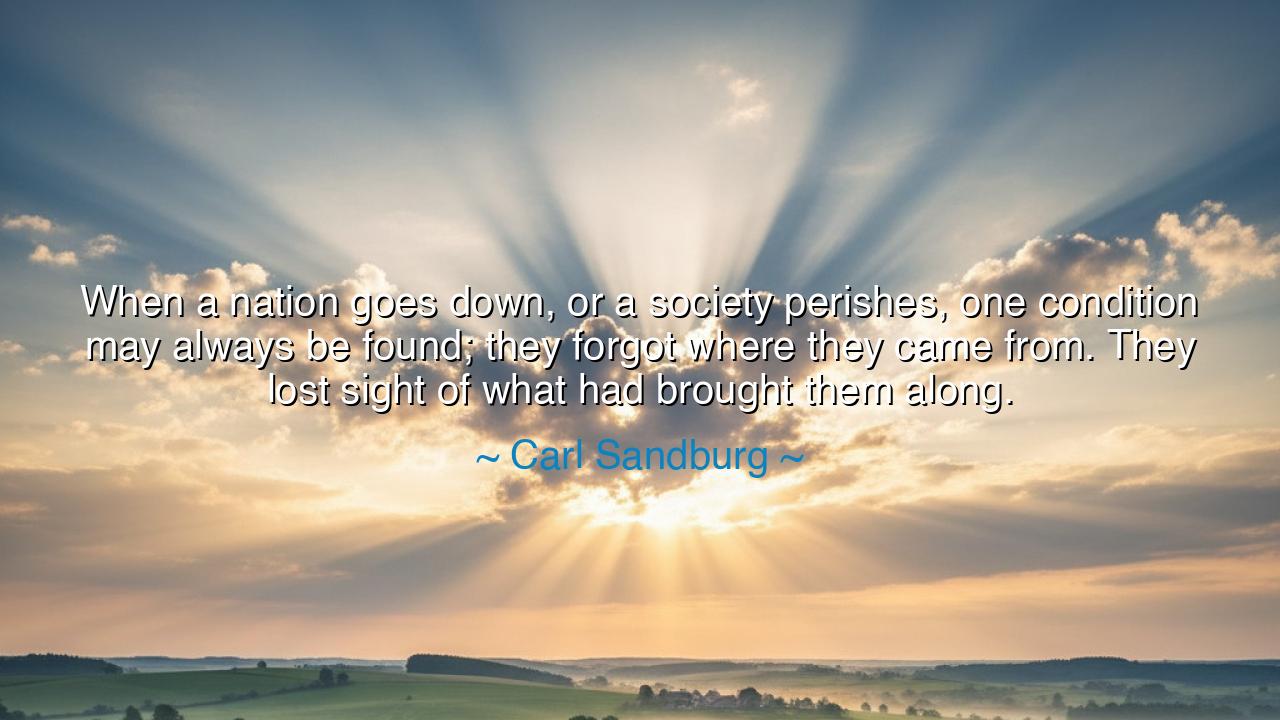
When a nation goes down, or a society perishes, one condition may
When a nation goes down, or a society perishes, one condition may always be found; they forgot where they came from. They lost sight of what had brought them along.






Hear, O child of memory, the grave words of Carl Sandburg: “When a nation goes down, or a society perishes, one condition may always be found; they forgot where they came from. They lost sight of what had brought them along.” This is not merely the poet’s lament, but the historian’s warning and the prophet’s cry. For Sandburg reminds us that no people fall in a single day—their ruin begins when they no longer remember their roots, when they cast aside the virtues, the struggles, and the sacrifices that once gave them strength.
To forget where one came from is to break the cord that binds past to present. A nation is not born in a moment but forged across generations—through toil, through hardship, through hope. Its ancestors bled and endured, built and dreamed, and from their labor came the blessings of the present. Yet when their children grow comfortable, when they feast but do not remember the hunger that once shaped them, when they dwell in ease but forget the sweat that raised their walls, then pride blinds them, and the pillars of their house begin to crumble.
Consider the Roman Empire, mighty and vast. In its youth, Rome was built on discipline, duty, and the stern virtues of its citizens. Farmers turned soldiers, soldiers turned builders, and all bore hardship for the sake of the republic. But in time, the Romans forgot the rugged spirit that had carried them. They turned from sacrifice to indulgence, from civic duty to personal pleasure. Bread and circuses replaced labor and virtue. The empire, though rich, decayed within, for it had lost sight of what had brought them along. In forgetting their beginnings, they invited their end.
Think also of the French Revolution. Born of suffering under monarchy and inequality, the people rose in the name of liberty, equality, and fraternity. Yet soon, in the frenzy of power, they forgot the principles that had carried them into revolt. Justice gave way to terror, and the dream of freedom was drowned in rivers of blood. They forgot that the revolution had begun with the cry for human dignity; instead, they repeated the tyranny they sought to destroy. The nation survived, but only after learning bitterly what Sandburg would later declare: to endure, one must always remember one’s beginnings.
Sandburg’s words are also a mirror to our age. In times of wealth and technology, many nations boast of their power but forget the virtues that built them—hard work, unity, sacrifice, humility before history. When comfort becomes entitlement and pride erases memory, the fate of past civilizations whispers again. The test of endurance is not how high a people rise, but whether they still remember the foundations upon which they stand.
The lesson is clear: if you would keep your house strong, remember its builders. If you would keep your nation alive, teach its children the stories of struggle, the battles fought, the hopes carried, the mistakes endured. Do not let prosperity erase memory, nor success blind you to origins. A tree without roots withers, and a people without memory perishes.
So I say to you: hold fast to remembrance. Tell the stories of your ancestors. Honor the struggles that gave you the ground on which you stand. Teach the young not only what they have, but how it was earned. For only when a society remembers where it came from can it chart where it is going. Let Sandburg’s wisdom ring as a call to vigilance: never forget, lest forgetting becomes the first step toward your fall.






AAdministratorAdministrator
Welcome, honored guests. Please leave a comment, we will respond soon